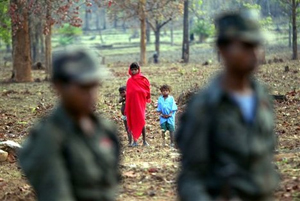 Jagdalpur, Jun 5: Maoists have come up with an ingenious ploy to snatch arms from the security forces deployed in Chhattisgarh. They are using children to get this task done. The rebels clothe their gun-snatching squads in school uniforms which makes it impossible for the security forces to fire at them as photographs of dead schoolchildren would invite national and international outrage.
Jagdalpur, Jun 5: Maoists have come up with an ingenious ploy to snatch arms from the security forces deployed in Chhattisgarh. They are using children to get this task done. The rebels clothe their gun-snatching squads in school uniforms which makes it impossible for the security forces to fire at them as photographs of dead schoolchildren would invite national and international outrage.
Speaking to Media, Bhagwat Bhagel, a sub-inspector who was shot at and injured by the Maoists in Sukma in the May 25 attack that killed 30 people, revealed how uniformed boys, as young as 10 years old, snatched weapons from injured and dead personnel. Baghel, 35, was posted near Kistharam police chowki area, close to Andhra Pradesh border.
"We went into the forest in two groups (of about 30 each) to collect bamboos for some work and were marching as per the set protocol unaware of Maoist presence ahead," said Baghel, who was discharged from the hospital for gunshot wounds two days ago.
Constable Parshuram Makram and head constable Narayan Major were killed in the ambush. "I took shelter behind a tree after two shots. I saw four children, 9 to 10 years old, dressed in school uniforms, approaching the dead constable's body and taking his SLR and ammunition. Then they went to Major Narayan, who was unconscious at that time, and took his AK-47 and ammunition.
"The fourth boy, also wearing a school uniform, was on a bicycle and took away the weapons while other Maoists, who had surrounded the police station, were giving them a covering fire," said Baghel. "I could have shot them but looking at their age, I controlled myself," he added.
The firing lasted for more than two hours.
"The boys in school uniform were not armed. They just came, snatched the weapons and escaped. Had our people shot at them, many would have been after our life. This is a disturbing trend that has come to fore," said a special task force officer wishing anonymity.
These students are members of a small action team and they roam around in markets wearing blue coloured school uniforms. "Boys found wearing school uniforms at odd times are questioned and kept under surveillance. Still it's a difficult task to arrest them," said Sukma SP Abhishek Shandlya. Intelligence officials claim that the Maoists are recruiting more young boys for their small action team. A 17-year-old Maoist, alleged to be part of small action team from an area bordering Chhattisgarh was nabbed by a police team from Balaghat on Tuesday.
Meanwhile, former chief minister of Madhya Pradesh and AICC general secretary Digvijay Singh on Tuesday visited the native place of slain Congress leader Mahendra Karma and met his family members and offered condolences. Later, talking to reporters, Singh accused the BJP government for total failure in maintaining law and order despite the Centre allocating enough forces to the state.





Comments
Add new comment